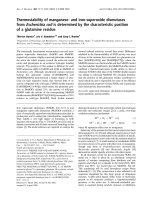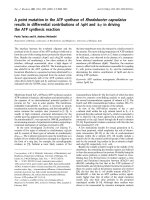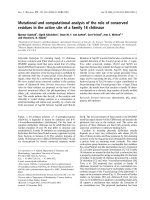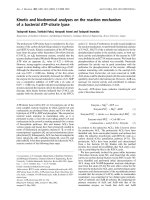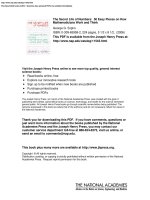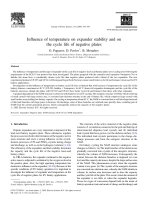Garlic and Sapphires : The secret life of a restaurant critic in disguise41436
Bạn đang xem bản rút gọn của tài liệu. Xem và tải ngay bản đầy đủ của tài liệu tại đây (1.07 MB, 348 trang )
‘Every restaurant is a theatre ...
and even modest restaurants offer the
opportunity to become someone else, at
least for a little while.’
When Ruth Reichl signed up to be The New York Times
restaurant critic, her picture was posted all over town. She
received special treatment whether she liked it or not. Yet to
be a good critic, anonymity was surely a prerequisite. How
else could her dining experience be authentic for her
audience?
Garlic and Sapphires is a wildly entertaining chronicle of
Reichl's New York Times years.
COVER IMAGE: GETTY IMAGES
COVER DESIGN: NADA BACKOVIC
ALLEN&UNWIN
ISBN 1-74114-644-5
9 781741 146448
AUTOBIOGRAPHY
www.allenandunwin.com
RUTH REICHL
Never afraid of a challenge, Reichl adopted a radical way of
eating incognito. Amassing a wardrobe of wigs and
costumes for her different personas, she experienced dining
as Miriam the Jewish mother, Molly the schoolmarm or
Chloe the seductress to name but a few. The resulting
reviews were her ‘adventures in deception’ – hilarious and
sobering, full of fascinating insights and delicious gossip.
THE
S EC R E T L I F E
OF A
R E S TA U R A N T
CRITIC
IN
DISGUISE
RUTH
REICHL
Praise for Ruth Reichl
‘[Garlic and Sapphires] lifts the lid on the city’s storied restaurant culture
from the democratic perspective of the everyday diner … Reichl’s ability to experience meals in such a dramatic way brings an infectious
passion to her memoir … Next time readers sit down in a restaurant,
they’ll notice things they’ve never noticed before.’
–Publishers Weekly
‘… for foodies with a penchant for the inside scoop, Reichl's behindthe-scenes stories of the Gray Lady deliver the goods. Before working at
the [New York] Times, Reichl was quite happy writing restaurant reviews
at the Los Angeles Times; she was wooed and won in spite of her misgivings … A casual Californian, she widened the paper's scope to
include as many truly fine restaurants as she could find, touting
soba, bulgogi and sushi to readers more accustomed to reading about
Continental cuisine … Reichl excels at making long-gone meals live
vividly on the page. [Garlic and Sapphires] is spicy and sweet by turns,
with crackle and bite throughout.’
–Kirkus Review
‘While all good food writers are humourous … few are so riotously,
effortlessly entertaining as Ruth Reichl … [she] is also witty,
fair-minded, brave, and a wonderful writer.’
–New York Times Book Review
‘Reading Ruth Reichl on food is almost as good as eating it … [she]
makes the reader feel present with her, sharing the experience.’
–Washington Post Book World
‘[Tender at the Bone] is an absolute delight to read … how lucky we are
that [Reichl] had the courage to follow her appetite.’
–Newsday
Also by Ruth Reichl
★
Tender at the Bone
Comfort Me with Apples
RUTH REICHL
a sue hines book
allen & unwin
This edition published in 2005
First published in Australia 2005
First published in the United States in 2005
Random house, Inc., 1540 Broadway, Ne York NY 10036
Copyright text © Ruth Reichl 2005
All rights reserved. No part of this book may be reproduced or transmitted in any form or by any
means, electronic or mechanical, including photocopying, recording or by any information storage
or retrieval system, without prior permission in writing from the publisher. The Australian Copyright
Act 1968 (the Act) allows a maximum of one chapter or 10% of this book, whichever is greater,
to be photocopied by any educational institution for its educational purposes provided that the educational institution (or body that administers it) has given remuneration to Copyright Agency
Limited (CAL) under the Act.
The following columns originally appeared in the New York Times, and they are reprinted here with
permission. The New York Times owns the copyright in the columns. Enquiries concerning permission
to reprint any column or portion of it should be directed to The New York Times Company, Rights
and Permissions - Ninth Floor, 229 West 43rd Street, New York, N.Y. 10036.
Le Cirque, October 29, 2003
Honmura, September 10, 1993
Lespinasse, March 11, 1994
Daniel, November 11, 1994
Kurumazushi, October 6, 1995
Tavern on the Green, December 8, 1995
Windows, November 8, 1996
Box Tree, March 11, 1998
Sparks, March 25, 1998
Union Pacific, August 5, 1998
‘Why I Disapprove of What I Do’ [NYT Magazine], March 10, 1996
A Sue Hines Book
Allen & Unwin Pty Ltd
83 Alexander Street
Crows Nest NSW 2065
Australia
Phone: (61 2) 8425 0100
Fax: (61 2) 9906 2218
Email:
Web: www.allenandunwin.com
National Library of Australia
Cataloguing-in-publication entry:
Reichl, Ruth.
Garlic and sapphires : the secret life of a restaurant critic in disguise.
Australian ed.
ISBN 1 74114 644 5.
1. Reichl, Ruth - Biography. 2. Women food writers United States - Biography. 3. Cookery. I. Title.
641.5092
Cover designed by Nada Backovic
Typeset by Prowling Tiger Press
Printed in Australia by Griffin Press
10 9 8 7 6 5 4 3 2 1
For my family, all of you,
with many thanks and much love.
contents
★
The Daily Special
Backstory
Molly
1
7
23
The King of Spain
35
Looking for Umami
Miriam
81
Meat and Potatoes
Chloe
Brenda
57
103
125
153
Dinner with Chairman Punch
Betty
181
205
Food Warrior
235
The Missionary of the Delicious
Emily
283
Ghosts
307
Recipe Index
330
Conversion Table
Acknowledgements
331
332
261
Garlic and Sapphires
The Daily Special
Y
ou gonna eat that?”
The woman is eyeing the tray the flight attendant has just set
before me. I can’t tell if she wants reassurance that I find it as re-
pellent as she does or if she is simply hungry and hopeful that I will hand
my food over. I loosen my seatbelt, swivel in the narrow seat, and see that
her face holds a challenge. Is she daring me to eat the food?
It steams unappetisingly up at me: a squishy brown square of meat
surrounded by a sticky stockade of potatoes that might have been
mashed last year. The wrinkled grey peas look as if they were born in a
laboratory test tube. The roll glows with such an unearthly lunar yellow
that I can feel its chill before my fingers even touch the surface. The lettuce in the salad has gone brown at the edges, and the tomatoes are too
tired to even pretend that nature intended them to be red. The dressing
in its little cup stares up at me, bright orange. I stare back.
“Nah,” says the woman, “you won’t eat that. Not our little Ruthie!”
Triumphantly she snatches the neon roll from my plate. “I’d like your
butter too, please,” she says, reaching for it.
2 • Garlic and Sapphires
I stop her hand in midair. “Do I know you?” I ask. She grins enigmatically, and I realise that she has a slight gap between her teeth. Her hair
is blonde and she is blowsily attractive; for a moment I wonder if she’s
Lauren Hutton. But what would Lauren Hutton be doing here, wedged
into steerage, stealing my roll?
“No,” she says, retrieving her hand. She snags the butter. “But I know
you. I even know why you’re on this plane.”
“You do?” I say, rather stupidly. She has wolfed down the roll and now
has her eye on the dubious meat. “Please,” I say, “help yourself.” She
grabs the plate.
“I didn’t think that you would be eating this stuff,” she says. “Truth be
told, I’d be disappointed if you did.”
“But who do you think I am?” I ask.
“Oh, sweetie,” she says, the s hissing snakelike from the gap in her
teeth, “I don’t think. I know. In fact, if you would be kind enough to tell
me where you’re going to eat when we land in New York, you’d be doing
me a big favour.”
“What on earth are you talking about?” I am truly baffled now. She
has gobbled up the protein, avoided the peas, and her pale blue eyes are
staring longingly at the sad salad. “Be my guest,” I say, holding out the
plate.
“Your picture is all over New York,” she says, her mouth full of lettuce.
“You’re the restaurant critic of the Los Angeles Times, but you’re about to
become the most important restaurant critic in the world. You start at
the New York Times on”—she pauses for a moment, calculating—“Friday,
September third!” She forks up the last of the salad and adds, “Every
restaurant in town has your picture pinned to the bulletin board, next to
the specials of the day.”
“You can’t be serious,” I say.
She nods her blonde head vigorously, and the lank hair whips across
her face. As she shoves it out of her eyes I notice that she is wearing a
sparkly little bracelet that spells out “Jackie” in rhinestones, that her
nails are covered with chipped purple polish, and that her muscled arms
The Daily Special • 3
look as if they have carried a lifetime of heavy trays. “I am. The place
I work isn’t the world’s best restaurant, but the boss has a standing offer
of five hundred bucks to anyone who spots you. Forget anonymity. A
good review from the New York Times is worth thousands.” She considers
for a few seconds. “Could be millions.”
“But it’s only June! It’s three months till I even start the job.” I am
truly stunned.
“I know,” she says, wagging one of those purple fingers in my face,
“but if your first review’s in September you’ve got to be eating somewhere now, don’t you?” There’s a certain triumph in her voice as she
adds, “You see, there’s not much we don’t know about you.”
“What do you know?” This comes out a little more nervously than I’d
like.
“Oh,” she says breezily, “ask me anything. You’ll see.”
“Am I married?”
“Please,” she scoffs, “ask me something harder than that. Your husband’s name is Michael Singer, he’s a producer at CBS, and he does
mostly investigative work. I know he won a Peabody Award last year for
something he did on the Mafia and the recording industry.”
“How could you know that?” I ask.
“I told you,” she says, “we’ve been studying you. We all have. Didn’t I
say we were on the lookout for you? No critic eats alone, so that means
watching for him too. Not to mention your kid. He’s about four—”
“Four and a half,” I say, the response so automatic that it is out before
I realise that I ought to be feeding her misinformation, not filling her in.
“At least I know you’re alone on this trip,” she says a little too smugly.
“That’s useful.”
“They could be joining me later,” I point out.
“They could . . .” she says, considering. Then she cocks her head to
one side and says, “Nah, I’d guess not. Guys don’t have any patience, and
in my experience it’s always the woman who has to travel with the
children. If Michael were coming, you’d have the kid.”
“What are you,” I ask, “Mickey Spillane?”
4 • Garlic and Sapphires
“In this business,” she confides, “it pays to keep your eyes open. You’d
be surprised how much you can figure out about people after they’ve
been sitting at your table for a couple of hours. It makes the job more
fun. This is how I figure it: You’re on your way to New York to do a little
restaurant research. And maybe look for an apartment?” Her eyes meet
mine as she says this, and they light up.
“Gotcha!” she says. “You are!”
I’m also looking for a nursery school for Nick, but I manage not to
blurt this out. When I don’t reply, my new friend examines my tray to see
if it contains anything else she might desire. She seems to be waging an
inner skirmish over the ice cream bar that now sits there, forlorn and
alone. But she abandons the struggle to say smugly, “Well, don’t think
one of those big hats is going to protect you.” She studies my face, as if
memorising it, her eyes slowly moving from the long, tangled brown
curls, past my thick bushy eyebrows and slightly tilted brown eyes to take
in my pale skin and large mouth. At last she produces a bumptious New
York smile and adds, “You’re going to find that being our critic is very
different from being the restaurant critic of the L.A. Times. We’re not so
easy to fool.”
“I can see that,” I say sincerely. In the fifteen years I’ve been a restaurant critic in San Francisco and Los Angeles, nobody has ever bothered
to study me before. This woman knows a scary lot about me: I wouldn’t
be surprised if she knows that the New York Times is going to pay me
$82,000 a year (a cut from what I’ve been making in Los Angeles), or
even that CBS has been very good about letting Michael move to the
New York bureau. Knowing that my personal life is now public makes me
so nervous that I try to change the subject. “Please,” I say, holding out my
ice cream, “take this. I need to save my appetite for dinner.”
She accepts. “No wonder you’re so thin,” she says. Peeling off the paper wrapper, she looks at the ice cream before taking a bite. Mouth full,
she adds, “This isn’t bad. But I’d much rather have the name of the
restaurant you’re going to tonight. It’s worth a lot of money, and I could
certainly use it.”
The Daily Special • 5
“Not a chance,” I reply, and turn to stare at the clouds floating outside the window like great billows of Marshmallow Fluff.
“You’ve finished everything!” says the flight attendant when she picks
up the trays. She seems genuinely surprised.
I smile up at her. “This was an educational lunch.”
“Oh,” she says, looking slightly bewildered, “I’m glad.” Piling the trays
onto her cart, she adds, “People don’t usually say that.” Then she pushes
off quickly, as if she’s afraid that I will attempt to engage in further discussion of the food.
But food is the farthest thing from my mind: I am considering my
next plan of action. One of the primary requisites of a good restaurant
critic is the ability to be anonymous. Clearly I am going to have to do
something. But what?
Flying east, it takes four and a half hours to go from LAX to JFK. It is
just long enough. By the time we land I have figured the whole thing out.
Backstory
T
his is Warren Hoge,” announced a self-satisfied voice when I
picked up the phone, “assistant managing editor of the New
York Times.” He proclaimed it proudly, as if faint trumpets were
sounding off in the background.
“Yes?” I said, hoping my tone conveyed more interest than I was actually feeling. It was two months before that fateful trip to New York, and
I was staring across the sad, low landscape of downtown Los Angeles,
wondering how to make Easter more exciting. Holidays are a restaurant
critic’s nightmare, and this one, with its perennially boring brunches featuring ham or lamb, is particularly gruesome. The copy I had just produced was deadly.
“I suppose you’ve heard that our restaurant critic, Bryan Miller, has
decided to leave the job?” the voice continued. This bland assurance
that the eyes of the entire world were focused on Times Square was so
irritating that I lied. “No,” I said, “I hadn’t heard that.”
The voice ignored this. “I was thinking,” it continued smoothly, “that
8 • Garlic and Sapphires
it can’t be much fun for you, being a restaurant critic in the middle of a
recession . . .” I dropped Easter; he had captured my attention.
The eighties hit Los Angeles like the month of March: they came
roaring in, then tiptoed sheepishly out as the money stopped and the
good times ended. It all happened so fast: First the aerospace industry
shut its doors and the city slumped into depression. Then the cops beat
Rodney King on the nightly news, exposing the racism that had been
hiding behind the prosperity. The anger simmering just below the surface erupted into a furious boil. Riots were followed by floods and then
fires, which spilled out across the city in an almost biblical manner.
When the tide of disasters finally receded, the city it left behind was thin,
brittle, dangerous, and poor.
The very rich retreated into their golden communities—into Bel Air,
the Palisades, and Beverly Hills—locking the gates behind them. The
valleys on the far side of the mountains swelled with fleeing people.
Those of us left in Los Angeles huddled in our houses, haunted by memories of snipers shooting from freeway overpasses, looters setting fires
that came creeping inexorably into our neighbourhoods, contorted
faces throwing rocks. Staying home seemed the safest option, and the
great Los Angeles restaurant boom came screeching to a halt.
“New York is the centre of the American restaurant world.” The
man’s sinuous voice wormed its way into my ear and I imagined him
holding out an enormous, bright red apple.
I was not about to bite. “I have a job, thank you,” I said crisply. “I love
working at the Los Angeles Times. I’m not looking to move.”
B
ut he wouldn’t take no for an answer,” I told my husband when I got
home. “When I told him I was going to be in New York in a couple
of weeks for the James Beard Awards, he made me agree to meet him for
coffee.”
“I’d love to leave L.A.,” Michael said wistfully.
“Don’t even think about it,” I warned him. “It’s not an interview. It’s
Backstory • 9
just coffee. I’ll only be there fifteen minutes. I can’t resist the chance to
see the Times offices, but I have no interest in working there.”
“Of course not,” said Michael. “Why on earth would you want to work
at the best paper in the world?”
F
or the next two weeks Michael issued nightly bulletins about the
New York Times and its search for a new critic. He refused to tell me
where he was getting his information, but he seemed to know everything. The paper, he said, had offered the job to Molly O’Neill, who did
not want it. “Apparently,” Michael said, “she has a weight problem.”
Bryan Miller was pushing one of his friends as a replacement, and the
editors were being inundated by calls from critics all over the country.
Michael, nevertheless, was convinced that the job was mine.
“They haven’t even offered it to me,” I kept telling him.
“They will,” he said loyally. “You’re the best critic in the country.” It’s
comforting when the people you love believe in you, but his confidence
also unnerved me. When I was honest with myself, I saw that I was terrified of going to work at the New York Times.
“There are lots of good critics out there,” I told him.
“Not like you,” he said steadfastly. “The job’s yours for the taking.”
He was still repeating this mantra when I left for the airport. “Be nice
when you meet Warren Hoge,” he urged.
“Mummy’s always nice,” said Nicky with the uncritical devotion of a
four-year-old.
Michael picked him up and cradled him in his arms. “Wouldn’t you
like to live in New York?” he asked.
“No,” said Nicky.
I gave him a kiss, nuzzling the soft skin of his neck. “I’m just going for
coffee,” I murmured, breathing in his sweet baby smell.
“Right,” said Michael, closing the door.
•
•
•
10 • Garlic and Sapphires
B
ut I landed in New York to find the weather itself conspiring against
me. It was one of those magical Manhattan springs; fresh winds
were blowing gently across the island so that each time I inhaled, I
breathed in the faint salt smell of the ocean. Daffodils and tulips nodded
from every corner; lilacs and apple blossoms danced through the parks.
On the avenues tables and chairs edged slyly onto sidewalks, promising
summer. The sun poured from the sky like honey, and people threw
back their heads and drank it in.
At Tiffany’s the windows were filled with eggshells, cracked open, spilling diamonds. Customers strolled through fancy food stores collecting
wild strawberries imported from France, Japanese beef bred on beer,
hand-churned cream from grass-fed cows, and caviar by the pint. The
restaurants were packed with handsome people begging for tables, and
great crowds jockeyed in the museums, trying to get a better view.
Marble buildings once black with soot had been polished to a shine, and
the statues all over town were newly gilded. Alone in New York, I
wandered the streets and allowed the city to seduce me.
I
made my way back to the hotel, thinking that life in New York might
not be so bad. Then a sharp female voice jerked me back to reality.
“This is Carol Shaw,” said the woman on the phone. “I’m calling to
give you your schedule at the New York Times.”
“Schedule?” I asked. “What schedule? I’m supposed to meet Warren
Hoge for coffee at three.”
“Oh,” she said, her voice softening slightly, “you haven’t heard.”
“Heard? Heard what?”
“About Warren,” she said. And now her voice dropped to a whisper.
“He’s in the hospital.”
“I hope it’s not serious?” I said. “I guess we’ll have to meet some other
time.”
“But we were hoping you’d go see him tomorrow!” she cried. “We’ve
planned your whole day!”
Backstory • 11
“Excuse me?”
“You start by visiting Warren at New York Hospital at nine. Then we
have set up appointments for you with—” she started ticking off names.
“And finally,” she continued, “you’ll go to the five o’clock editorial meeting and end the day in private session with the editor, Max Frankel, and
the managing editor, Joe Lelyveld.”
“I don’t have time for all that,” I said. “I’m really very busy. I’d only
planned to spend fifteen minutes with Warren.”
“I understand perfectly,” she replied. Her voice was as brittle as ice.
Even the secretaries here have attitude, I thought, wondering how I could
allow a woman I had never met to guilt-trip me. This Shaw person was
somehow able to make her voice convey both empathy and accusation.
“What happened to him?” I asked, relenting a little.
“He was in a restaurant,” she said. “He fell down some stairs, broke a
rib, and the rib punctured his lung.” There was a strangled sound to her
voice; was she trying to repress a laugh? In response I found myself biting back an inappropriate giggle.
“Please give him my best wishes,” I said, grateful that my voice
sounded normal. “Tell him I hope he’ll be better soon. And that I look
forward to meeting him the next time I come to New York.”
“I’ll do that,” she said.
I
immediately dialled Michael. “Can you believe the nerve of these
people?” I asked. “They just went ahead and set up a whole day of in-
terviews without even asking me!”
“C’mon, Ruth,” he replied, “it’s the New York Times! You know you
won’t be able to resist meeting with them at some point. Why not see
them now and save yourself another trip?”
“You just want to get out of Los Angeles,” I said.
“It’s true,” he said. “But if you’d spent the last two years covering the
riots, the Rodney King trial, the gang wars, and then another Rodney
King trial, you’d want to get out too. This job isn’t much fun; all the news
12 • Garlic and Sapphires
in L.A. is depressing and it’s not going to get better any time soon.
There’s no political will for change. I look down the road and I see
myself reporting on racism, gangs, and poverty, with the occasional
earthquake thrown in for variety. I’d like to go somewhere, anywhere,
with a different story. But that’s only part of it; I really think that this is
an important opportunity for you. New York could change your life.
I know you’re scared, but you can do this. I’ll be there for you in every
way I can, but don’t walk away from this job.”
Michael’s faith in me was so touching that it forced me to consider
the consequences of talking to the editors of the Times. I realised that
once I had gone for the interview and made a good impression, it would
be difficult to refuse the job. By the same token, if I was certain that I had
no interest in becoming the restaurant critic of the New York Times, all
I had to do was make sure they didn’t want me. I had to make myself undesirable. Now, I decided, was the perfect time to begin the campaign.
“Fine,” said Carol Shaw when I called back. “I’m glad you’ve changed
your mind.” She did not sound the least bit surprised. “Do you know how
to get to New York Hospital?”
H
ey girlie,” said the grizzled coot in the second bed. Monitors above
his head flashed his pulse and heart rate; bells pinged, lights
flashed. “You here to see Warren?” He eyed my legs.
“Yes,” I said, smoothing my black suit, wishing my skirt were a little
longer. The two other men occupying beds in the room looked on with
interest.
“They took him down for X-rays, sort of unexpected. He said for you
to wait.”
“Here?” I asked.
“That would be fine with me,” he said. “But Warren said something
about the waiting room. It’s down there.” He jerked his head to show me.
The waiting room looked like a graveyard for rejected flower arrangements. A couple of potted palms drooped in the corner, and vases filled


